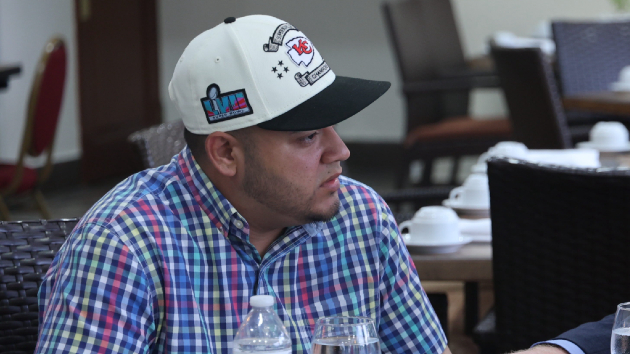
(NEW YORK) — Kilmar Abrego Garcia’s legal team asked a judge at a hearing Friday to order that he not be removed from the United States without at least 72 hours notice should he be released on bond from detention in Tennessee.
On Day 3 of a hearing in Maryland on the government’s plans for the longtime Maryland resident this week, U.S. District Judge Paula Xinis repeatedly blasted the government for what she said was an insufficient effort to address what exactly will be done to ensure due process for Abrego Garcia if he’s taken into ICE custody following his release.
“We’re asking for 72 hours, 72 hours notice, so that my client can have an opportunity to run to whatever is the appropriate court at that moment to get relief before he’s shipped off to an as-yet-unidentified country and he’s potentially subject to torture or persecution in violation of a court order. That’s all we’re asking,” Abrego Garcia’s attorney told the judge.
The judge did not rule from the bench but said she would do so soon.
Abrego Garcia, a Salvadoran native, was deported in March to El Salvador’s CECOT mega-prison — despite a 2019 court order barring his deportation to that country due to fear of persecution — after the Trump administration claimed he was a member of the criminal gang MS-13, which he denies.
He was brought back to the U.S. last month to face charges in Tennessee of allegedly transporting undocumented migrants within the U.S. while he was living in Maryland. He has pleaded not guilty.
Government attorneys have said that, should Abrego Garcia be released on bond, he could be deported again, but Abrego Garcia’s legal team has argued he should be transferred from Tennessee to Maryland to await trial.
Judge Xinis, however, acknowledged the government’s position that there’s no ICE detention facility in Maryland.
The judge also said that restoring the status quo would mean returning Abrego Garcia to Maryland as that’s where “he was arrested in Baltimore without any proof” — but the government argued that his removal process started in Texas when he was taken into ICE custody.
“We may have a disagreement on what the status quo is, Your Honor … with respect, we disagree, but obviously your opinion matters more,” the DOJ attorney said.
Xinis said she doesn’t necessarily think sending Abrego Garcia back to his family in Maryland is the “proper full relief,” but added, “I do know there’s a real question in my mind: Does he get the process to start over through Immigration in Maryland?”
The judge also slammed the lack of detailed answers provided by ICE official Thomas Giles during his testimony Thursday, when he was asked to explain the government’s plans for Abrego Garcia’s deportation.
“The reality is, this has been a process. From Day 1, you have taken the presumption of regularity and you have destroyed it, in my view, because I can’t presume anything to be regular in this highly irregular case,” the judge said at the start of Friday’s hearing when a DOJ attorney wasn’t able to produce Abrego Garcia’s detainer document that she had asked for on Thursday.
The government subsequently produced the document later in the hearing.
Declaring that Giles’ testimony “insults my intelligence,” Judge Xinis said that getting specific information is critical due to the extraordinary situation in which the government has already wrongfully deported Abrego Garcia once.
“So this — we’re not operating on a clean slate at all,” she said. “It seems like this would be the case where you’d want to put a little meat on the bones of exactly how you’re going to do this lawfully and constitutionally.”
DOJ attorneys said the government has yet to decide if Abrego Garcia will be removed to a third country or if proceedings to remove him back to El Salvador will be reopened, and that the decision will be made by a case officer once he comes under ICE’s custody.
When the government said an ICE case officer will decide how to move forward with Abrego Garcia’s deportation process once he’s in ICE custody, the judge expressed doubt about the agency’s process, saying Abrego Garcia’s removal process has been “altered, all depending on” the Trump administration’s interests.
“That is plainly insufficient to tell me what’s going to happen to Mr. Abrego apart from what you would have me believe, which is that we’ve given this no thought, no conversation, no pre-planning, we’re just going to roll the dice on Wednesday or whatever day he’s released, if he’s released to ICE custody. And I’m just telling you, I’m not buying that,” Judge Xinis said.
When a DOJ attorney said that’s not a fair characterization of the government’s position, saying the decision will be made by an ICE officer like all other cases, the judge accepted the answer but remarked that it makes their argument “weaker.”
Judge Xinis also repeatedly pressed the government on what she described as an “inconsistent” policy in its third-country removal process — comparing a DHS memo from March to an email advisory ICE sent out to its officers earlier this month, the latter of which described the possibility of a person being removed from the U.S. without an opportunity to contest it based on fear of torture or persecution.
A government attorney replied that “there is no meaningful difference between what’s set forth in the March 30, 2025, process and the July 9 process,” and that should the third-country removal process take place, Abrego Garcia will be given written notice and an opportunity to contest it.
Copyright © 2025, ABC Audio. All rights reserved.




